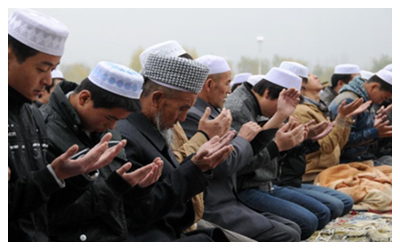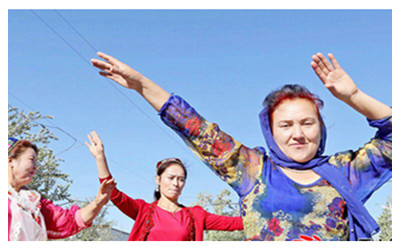Skype: neodalle-travel
Tel: +86 135 7447 2266
E-mail: sales@zhangjiajieholiday.com
Muslims dance in Kashgar, Xinjiang Uygur Autonomous Region, to celebrate Corban Festival, Sept 24, 2015. [Photo/Xinhua]
Corban Festival also known as Eid al-Adha or feast of the sacrifice, is a traditional festival celebrated by over ten ethnic minorities in China who confess Islam. It is an important annual traditional festival for Muslims, and is celebrated on Dec. 10th on the Islamic calendar, which is the beginning of Oct. on the western Gregorian calendar, when Muslims slaughter lambs to feed the hungry. This festival also has names: "Sacrifice Festival" or "Al Adha Feast". It is named with the Festival of Fast-breaking and Mawlid al-Nabi as one of the three major Islamic festivals. During the festival, people will take part in community worship to pilgrimage to Allah, and also, slay livestock and offer sacrifice to Allah, to whom they are desired to get closer.
Xinjiang has a population of more than 21 million, with more than half of Muslims from 10 ethnic groups, such as Uygur, Kirgiz, Kazak and Uzbek.
Before Corban, People clean their houses, tidy their clothes, make festival pastry, and prepare for livestock to be slaughtered. Breed of livestock varies with the financial conditions of every family, with sheep, cattle, camel and chicken as the common choice. People used to begin preparing for the festival two weeks in advance, cleaning their houses, preparing ethnic foods, and purchasing new clothes for the celebration. Those living away from family rush home to celebrate.
 The first day of the festival people go to the mosques at sunrise, wearing their finest clothes, to attend the largest religious service of the year. People listen to imams or interpretations of the Koran, and the sounds of the prayers can be heard from the mosques.
The first day of the festival people go to the mosques at sunrise, wearing their finest clothes, to attend the largest religious service of the year. People listen to imams or interpretations of the Koran, and the sounds of the prayers can be heard from the mosques.
On this specific day, everyone should fast for half a day until the end of the worship. After that, they should go back home and slay livestock. Livestock meat is usually divided into three portions: one for the family members, one for relatives and the rest for the poor. Then it is time for extending festival greetings, first to villagers having suffered family disasters such as funeral recently, then to the elderly, and finally to relatives and friends. According to the custom of Uyghur ethnic group, greetings to the elderly of husband's and wife’s families should be extended by the couple together, while those to others can be extended separately. Other than mutual greetings, a series of literary and art activities will be carried out to intensify the atmosphere of festival. For example, the Uyghur people who are apt at singing and dancing will hold a grand Maxi Laifu performance gathering at the square, where they will play musical instruments while singing and dancing.
 Its a time when Uygurs make rounds visiting parents and other elders in the family after the morning prayers.Every one is warmly welcomed and cordially treated during the festival. Besides Uygurs, other ethnic minorities such as Hui, Kazakh, Uzbek, Tajik and Kirgiz also celebrate the Corban Festival.
Its a time when Uygurs make rounds visiting parents and other elders in the family after the morning prayers.Every one is warmly welcomed and cordially treated during the festival. Besides Uygurs, other ethnic minorities such as Hui, Kazakh, Uzbek, Tajik and Kirgiz also celebrate the Corban Festival.
The festival lasts for 5 days. Each family slaughters a sheep, camels, cows or oxen and families and friends gather together to enjoy the dishes together. There is a lot of joviality, singing, and mirth surrounding this festival. Uyghur people in Xinjiang hold large singing and dancing performances, and Kazakh, Kirgiz, Tajik, and Uzbek people hold various celebrations including horse racing and wrestling. It is a good chance for people to enjoy a family reunion, and entertain their friends.
Women dance to celebrate Corban Festival in Hami, Xinjiang Uygur Autonomous Region, Sept 24, 2015. [Photo/iyaxin.com]
 Ask Questions ?
Ask Questions ?